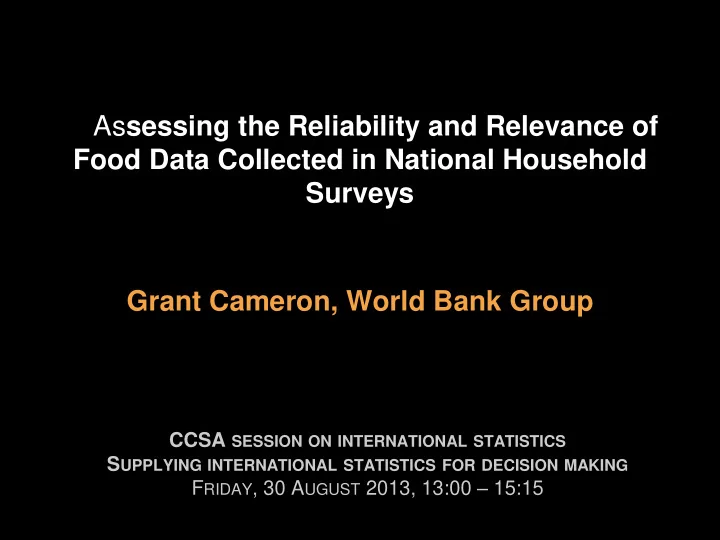

As sessing the Reliability and Relevance of Food Data Collected in National Household Surveys Grant Cameron, World Bank Group CCSA SESSION ON INTERNATIONAL STATISTICS S UPPLYING INTERNATIONAL STATISTICS FOR DECISION MAKING F RIDAY , 30 A UGUST 2013, 13:00 – 15:15
Context Household surveys (HHS) provide data for CPI, SNA, & living standards estimates HHS microdata accessibility is impetus for additional policy uses (“Re - purposing”) For low-capacity countries, data sources are limited. Re-purposing adds value at low additional cost. Re-purposing raises reliability and relevance issues to the policy issues being examined 1
Reliability and Relevance of Food Data Policy issues addressed by HHS food consumption data: CPI, SNA, Poverty analysis, food security, food fortification. Two step approach: 1. Develop method to assess reliability and relevance of survey questions* 2. Apply method to 100 HHS from low- and middle- income countries to determine improvements. * - assessment form: http://www.ihsn.org/home/node/34 2
Reliability: Definition “ Reliability”: the degree to which a survey collects data on the actual or “true” food consumption and/or expenditures of households in a country’s population. 3
Reliability: Approach Assess questionnaires over the following dimensions: 1. Recall period for at-home food data collection; 2. Modes of food acquisition (food purchases, food consumed from own production, and food received in kind); 3. Completeness of enumeration 4. Comprehensiveness of food lists 5. Specificity of food lists 6. Quality of data collected on food consumed away from home 7. Accounting for seasonality in food consumption. 4
Reliability: Assessment Findings 100 Percent 90 85.0 of 80 assessm 75.0 72.2 70.0 ent 70 surveys 60 meeting 54.2 53.1 minimum 50 reliability 42.0 40 criteria 30 20 12.9 10 0 5
Relevance: Definition “Relevance”: Data collected meets the needs of the current and potential users of the surveys. 6
Relevance: Approach Check for potential to calculate the following indicators: 1. Quantities consumed of individual foods 2. Calorie consumption and undernourishment 3. Calories consumed from individual foods & food groups 4. Protein and micro nutrient consumption / insufficiencies 5. Dietary diversity 6. Percent of hhlds consuming foods 7. Percent of hhlds purchasing foods 8. Percent of expenditures on foods / food groups 9. Expenditures by source 7
Relevance: Selected Findings Poverty measurement: 50% (of HHS) Food security: 10% Informing food balance sheets: 50% Nutrition interventions: 100% for %age of hhlds consuming individual foods, 10% for food quantities 8
Recommendations: Improving Reliability (1) Collect data on food consumed away from home Capture seasonal variation in food consumption and expenditure patterns. Collect data on all three sources from which food can be acquired 9
Recommendations: Improving Reliability (2) Complete enumeration of either all food acquired or all food consumed over the recall period Food lists cover all foods consumed, including processed foods Recall period of two weeks or less for the collection of data on food consumed at home. 10
Recommendations: Improving Relevance Collect the appropriate data for calculating metric quantities of foods Collect data on the specific foods and prepared dishes consumed away from home Survey food lists are sufficiently detailed for classification into food groups and conversion to nutrient content 11
Next Steps • Extend work to non food categories • Work to get international agencies to adopt recommendations when advising low-capacity countries 12
Recommend
More recommend